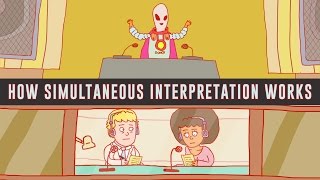In the simultaneous mode interpreters instantaneously translate a speaker's words into a microphone while he speaks without pauses.
在同传模式下,译员在不打断演讲者发言的情况下,对着话筒进行实时翻译。
Those in the audience can choose the language in which they want to follow.
观众可以选择收听的译入语。
On the surface, it all looks seamless, but behind the scenes,
在台上,一切都无比顺畅,但在幕后,
human interpreters work incessantly to ensure every idea gets across as intended.
译员们口笔不停确保所有信息翻译到位。
And that is no easy task.
而这并非易事。
It takes about two years of training for already fluent bilingual professionals to expand their vocabulary
即使是双语运用自如的专业人士,也要花上两年的时间扩展词汇,
and master the skills necessary to become a conference interpreter.
掌握必备技巧,方能成为大会口语员。

To get used to the unnatural task of speaking while they listen,
为了习惯这项边听边说的非常任务,
students shadow speakers and repeat their every word exactly as heard in the same language.
学生先是跟读,将演讲者的话一字不差的复述出来。
In time, they begin to paraphrase what is said, making stylistic adjustments as they go.
一段时间之后,开始转述讲话内容,转述时会适当调整文体。
At some point, a second language is introduced.
到了一定时候引入第二种语言。
Practicing in this way creates new neural pathways in the interpreter's brain,
如此练习会让译员大脑中形成新的神经通路,
and the constant effort of reformulation gradually becomes second nature.
重新组织语言表达渐渐成为第二天性。
Over time and through much hard work, the interpreter masters a vast array of tricks to keep up with speed,
经过日复一日的勤学苦练,译员掌握了如何跟上发言人语速,
deal with challenging terminology, and handle a multitude of foreign accents.
处理棘手的术语,应对形形色色的口音等一系列技巧。
They may resort to acronyms to shorten long names, choose generic terms over specific, or refer to slides and other visual aides.
他们可以采用缩写来简化过长的名字,用词宽泛避免太过具体,或者参考幻灯片及其视觉辅助物。
They can even leave a term in the original language, while they search for the most accurate equivalent.
他们甚至可以保留原词不做作翻译,直至找到最准确的对应词。
Interpreters are also skilled at keeping aplomb in the face of chaos.
译员也练就了泰山崩于顶而色不改的本领。


